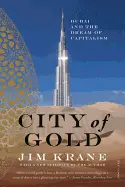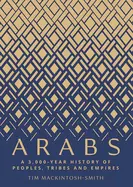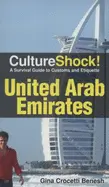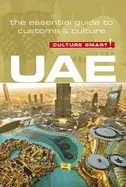Dubai was in my “Top 5 places where I NEVER want to go”.I heard it was commercialized hedonism, glorified overindulgence, pandering to millionaires and influencers — extravagance and opulence.Everything I hate.That’s why I had never gone there.
Last year, when I was booking a flight to attend a conference, there was going to be a short layover in Dubai.My first thought was “yuk”.But when I notice I’m prejudiced against something, it makes me curious.So I made it a 3-day layover, to see Dubai for myself.
learning before going
Before going to Dubai, I read two books about the culture of United Arab Emirates, and one about the history of Dubai.And WOW, it was so fascinating.
First, about the United Arab Emirates. (U.A.E.)Like the United States or Switzerland, it’s a collection of states — called emirates — of which Dubai is just one.Like New York, Dubai can refer to the big state or the city inside it.Dubai the city is in Dubai the state, which is one of the seven emirates of the U.A.E.Abu Dhabi is the biggest emirate, and Abu Dhabi the city is the capital of the country.
OK, so two quick things I like about U.A.E. as a country:
#2:
Part of the problem in African countries is due to European leaders in the 1880s carving up African territories with straight lines, ignoring ethnic and linguistic divides, tribal territories, existing kingdoms, and even geography.So when United Arab Emirates was becoming a country in 1971, its founders did the opposite.They went village to village, tribe to tribe, asking each which ruling family they were loyal to.Then that’s where they drew the boundaries between states.It’s more complex but more accurate, as it respects personal allegiances and relationships.I admire that care.
#1:
Sheikh Zayed, the father of the nation and its first president.I love this guy.The folk-legends of his generosity inspire me.He gave UAE its moral DNA.Religious tolerance, women’s rights, helping poorer nations, and gentle diplomacy to settle disputes.Like Lee Kuan Yew in Singapore, some founders leave such an influence on the culture of a country that just being in that place makes me want to be a better man.
UAE constitution guarantees women the same legal status as men, and equal pay.UAE has a greater percentage of women in parliament than do the US, UK, France, Canada, Greece, Ireland, Japan or Poland.Companies and government agencies are required to have women on their boards of directors.
The book “City of Gold”, about the history of Dubai, was so good — so well-written — that it made me really admire Dubai and Sheikh Rashid, its ruler who was responsible for the bold and savvy decisions that turned it from a tiny village into what it is today.See, Abu Dhabi has 95% of the oil, Dubai only has 4%, so Dubai had to be smarter, more competitive, and attract business to thrive.Sheikh Rashid was thinking long-term, had a vision of Dubai’s huge potential, and invested everything into its development in the 70s, even against his advisors’ advice.It seemed crazy at the time, but paid off in a big way 15-30 years later.It was quite entrepreneurial.
After reading these three books, I was so excited to go.
Arab hospitality
I especially love that Arab culture’s top value is hospitality.It’s understandable when you consider its Bedu origins.A stranger, riding across the harsh desert, arrives at your home, hungry and thirsty.You welcome them in, no matter who they are.You give them food and drink, and let them stay as long as they need.
The book “Arabian Sands”, set in the 1940s, describes this well.His Bedu colleagues had the absolute highest admiration for a man they knew that used to be wealthy, but slowly gave absolutely everything he had to his community and visiting strangers, leaving him with literally nothing.
Before flying to Dubai, I contacted a Saudi guy I met once in England.He had emailed me out of the blue a few years earlier and we had a meal and great conversation in Oxford.It was my first time meeting someone in full Arab outfit - the white robe and headdress with the black rope.I emailed him to say I was coming to Dubai, asking if he’d be around to meet.He replied, “My friend! Cancel your hotel! You will stay at my home in the Burj Khalifa!”I said, “Wow! Thank you. OK. It’ll be great to see you.”He said, “No, I won’t be there. I’m in Riyadh. But my uncle will pick you up at the airport and give you the keys, so you can stay as long as you like.”
The legendary hospitality is real.I had his home to myself for those three days.It was amazing.That’s Ali AlBallaa of AZM.So kind.
local tips before my trip
Lucas Skrobot is an American living in Muscat, Oman.He noticed I was reading books about UAE and Dubai, and asked about my interest.I told him I want to understand the local culture.He said I must meet Mohammed Kazim from Tamashee who leads cultural trips around the region, and is a wealth of historical and cultural knowledge.I thought he was going to be an ancient man with a long beard, but we’ll get back to him in a minute.
Elliot Shimmin is a Brit who was living in Abu Dhabi.He emailed me in advance and said I must go to the Centre for Cultural Understanding, and most of all, the Al Shindagha Museum.I’m so glad he did.We’ll get to that in a minute, too.
Dubai is the bar in Star Wars
As soon as I arrived at the Dubai Airport, I felt like I was in the cantina in Star Wars.People from all over the galaxy, wearing traditional clothes from Nigeria, Qatar, Ethiopia.Some women covered in full niqab.Some wearing almost nothing and covered in tattoos.Russians, Indians, and sunburnt Brits.Big bushy beards and hippie dreadlocks.Three-piece suits and shiny shoes.Flowing robes and sandals.Later in the Dubai Mall, I sat sipping tea for hours on the middle floor, just people-watching.I could sit in this place and watch all of humanity go by.As an amateur anthropologist, it’s heaven.This is the modern international trading port, like the legends of the Silk Road.Intersections of culture.East-meets-west, etc.This is it, here and now.This is where everything converges.
I’ve lived in New York City, London, Los Angeles, San Francisco, and Singapore.I love how multi-cultural they are.But nothing like this!Those cities are about 35% immigrants, whereas Dubai is almost 90%.My cultural curiosity has found its culmination.
I asked random strangers where they’re from.Every answer was different.Cameroon.Kerala.Pakistan.Tanzania.Philippines.Kuwait.Kazakhstan.Each was happy to tell me their story of why they moved to Dubai.
A man from the border of Pakistan and Afghanistan told me how he moved here twenty years ago, and has been bringing over family members every year, so now where he lives in Sharjah, just north of the city, there are over 120 of his relatives living in the same neighborhood.UAE welcomes immigrants and makes it easy for anyone talented to come and work.The population is 11 million but they are planning for 20 million, in infrastructure and housing.
The perfume house at Al Shindagha
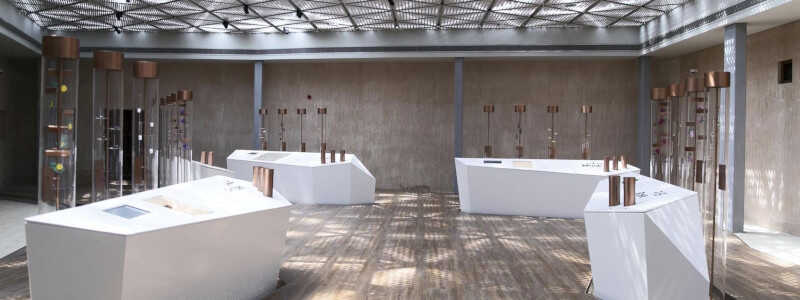
I spent my first day in Dubai at the Al Shindagha museum, which I highly recommend.It shows you Emirati culture, history, geography, and artifacts.It’s made up of a bunch of little buildings that were traditional homes.One subject per building.
One of the buildings is just about perfume, so I tried to skip it.I had no interest in girly perfume.But when I asked the guide how to go around it, she explained that it would be kind of difficult, so I might as well just go through it.I’m so so glad I did.This little building is now one of my favorite places on earth.
It has many different scents kept in airtight cylinders, so you can press a button to release a bit of the aroma, smell it, and close it again.No need to dab it on anything.You can smell the origin of incense, like oud, amber, and musk.Oud was my favorite.I couldn’t get enough.I kept going back to that cylinder.
And frankincense!!Oh my god.No wonder this stuff is legendary.Wait until you smell it.It’s amazing.
Incense is used all around public spaces in UAE, so to me it’s the first thing I remember when I think of being there.Those wonderful smells.I miss them so much.
One of the most interesting men I’ve ever met
Lucas drove up from Oman, and met me with Mohammed Kazim at the Tamashee store-front.The next four hours with them was one of the most interesting conversations I’ve ever had in my life.
First, since he was described as a wealth of cultural and historical knowledge, I was expecting to meet an old man, but he’s younger than me!And though he’s dressed in full Kuwait-style thobe, he has an American accent, and talks just like my old friends.
- his grandfather built the first building in central Dubaihe went to Boston for collegeback in Dubai after America, felt that the Bedu roots of Arab culture were getting lostleft the world of finance to start two passion projects: Tamashee traditional sandals, and cultural tours around the Arabian Peninsula
After I arrived, and he gave me the traditional coffee and dates, I asked his interest in traditional Arab culture.
He said:
“In Boston, I was missing home, and read a book about the Bedu culture in the 1940s.We used to let nothing go to waste.A foreigner threw a date pit in the fire, and the local Bedu man immediately rescued it, saying ‘In the desert, we can’t afford to waste anything.’Now look around at all the water we waste.We’ve lost touch with what made this culture great, so I want to help people reconnect with the roots of our culture.”
I asked him a question about the local culture, and he said, “It depends if you’re talking about the people from the desert, versus the coast, versus the mountains.”
I said, “Where is your family from?”
He said, “From the desert, but then two uncles got in a fight, splitting the family, and half went to Iraq for a while.They reunited in Abu Dhabi, but then Islam came along...”
I interrupted, “Wait. Islam came around the year 620. Have you been telling me your family history from two thousand years ago?”
He said, “Well, 1800 years ago, yeah.”
I said, “How on earth do you know your family history back that far?”
He shrugged, “We keep good records.”(I’ve asked other Emiratis since, and they all seem to know their family history this far back.)
Wow.Mohammed and Lucas and I ended up talking for hours about culture, history, religion, and more.Now I meet up with Mohammed every time I go through Dubai, and I hope to eventually take all of his cultural trips.
I want to live there
I’ve been back to UAE a few times since, getting to know many people that live there, and still love it.My best friend grew up in Abu Dhabi and raves about it.My interest in this part of the world feels bottomless.I love the culture and people.I still haven’t been to the other GCC countries, but I want to live there.Then you can all stay at my home, so I can return some of that hospitality.

